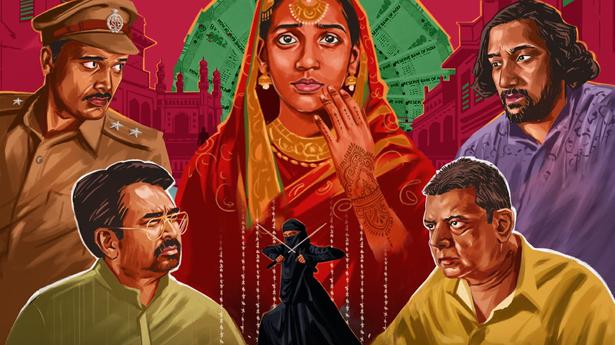
‘Qubool Hai?’ web series review: Authentic to its milieu
The Hindu
The Telugu-Dakhani series exploring child marriages and trafficking in Hyderabad’s Old City engages partially and scores on some fronts
A few years ago, when the digital space was beginning to open up, filmmakers saw it as an opportunity to tell stories without being tied down by box office constraints. Qubool Hai?, the six-episode Telugu-Dakhani series streaming on Aha, is one such example. Sans starry names, Qubool Hai? narrates a dramatised fictional story (by Pranav Pingle Reddy, Sanjiv Chakravarthy and Kevin Ronith Kumar) inspired by real incidents of child marriages and trafficking in Hyderabad’s Old City. Such a premise can lend itself to a compelling narrative. Directed by the trio Pranav, Umair Hasan and Faiz Rai, the series lives up to its potential in some portions but does not come together as a cohesive whole.
There is an authentic, lived-in milieu as Karthik Parmar’s camera leads us into a lower middle-class home that is decked up for a wedding. Beyond the gaiety is the sordid reality of a young girl, in her early teens, being married off to a much older Arab man. Over the years, there have been several news reports of girls being married to elderly men and later trafficked. The series turns its gaze on such instances that continue to happen and appreciably, without voyeurism.
The story is set in the Talabkatta area where circle inspector Faizal Khan (AJ Karrthik) is courting the media spotlight for cracking other, comparatively smaller crimes. A newcomer to this police station is Bhanu Prakash (Manoj Muthyam), who eventually wakes up to the marriage broker and trafficking nexus.
At an NGO that counsels girls who have been rescued, two teachers want to get to the root of the issue, though their paths are different. The physical education teacher Shahnaz (Abhilasha Poul) who teaches girls self-defence techniques wants to tackle the issue head-on while Khatija (Vaishali Bisht) believes in the long-term approach of counselling families against giving away their daughters in such marriages.
Things take a turn when 13-year-old Ameena goes missing. Life goes on in Talabkatta. The only one who has the sense of urgency to track the girl before it is too late is Shahnaz.
The story tries to find answers to pressing questions: what makes families gullible enough to buy into the lofty promises of marriage brokers? How does this network operate? All this unfolds at a rather unhurried pace, which turns out to be a dampener for the story. Perhaps it was intended to reflect the unhurried lifestyle of Hyderabad and the ‘chalta hai’ attitude, but it does not augur well.
On the brighter side, there are some good performances, especially by Abilasha and Feroze. The latter plays Asif, a character from the streets of the Old City, with the authentic Dakhani lingo and diction. Asif has a talent for predicting the outcome of cricket matches and makes tidy sums in betting; he also has a way of speaking and an easy demeanour. When things come to speed, it seems surprising that Asif is indeed naive to not know what he is getting into.











